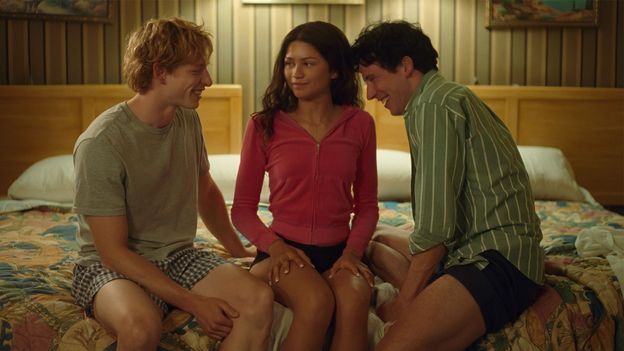The trailer makes a point of showing the three of them sitting on a bed, kissing, and in the film that scene works extremely well to set up tension, as we wonder how far any of them will go. Fair warning: that teasing sexuality is an anomaly, not the norm. Remember, Guadagnino is the director who put Timothée Chalamet and Armie Hammer in bed together in Call Me by Your Name, then discreetly turned the camera to look out the window at a tree.
In one of the screenplay’s shrewdest turns, Tashi sets up a contest that would have been thoroughly toxic if one of the men had suggested it. Art and Patrick are set to play against each other the next day, and whoever wins will get her phone number, she says. It’s the kind of subversive, unexpected twist the film could have used much more of. A few years later, Tashi is in college, where she suffers her career-changing injury, Patrick is her boyfriend and Art is pining away. O’Connor told Empire magazine about the film, “The tennis is the sex”, which is a great quote, and also… no. The tennis is the tennis and the sex is the sex. They never really come together, even when Tashi starts talking about tennis when she’s beginning to have sex with Patrick in her dorm room. But there is a definite electricity between Tashi and bad-boy Patrick that she does not have with safe, good-guy Art.
More like this:
The one thing that Back to Black gets so right
Civil War’s warning about the US political divide
The paranoid thriller more relevant than ever
The actors dash around the tennis court, but it is kind of shocking that Guadagnino uses some stale sports-movie tropes, including a slo-mo walk down a corridor to the court outside, and spectators at a match turning their heads right then left then right again in unison. The tropes may be used knowingly but they still look clichéd. And there is a thunderous Thwack! whenever anyone hits a tennis ball. One of the best surprises turns out to be the soundtrack by Trent Reznor and Atticus Ross, a propulsive techno score that does a lot of the work to keep the tennis scenes moving.
As the years go on there is betrayal and subterfuge all around, in scenes that surface here and there almost glancingly. More of the psychological intrigue would have helped. And the liveliness of the early scenes dissipates. By the end, Art is a depressed noodle. Zendaya spends the final stretch looking stern, although she does play the last tricky scenes very well, as we are led to question what Tashi’s motives are when she makes another audacious move.
In the last tennis match, the camera swishes around so fast the screen looks like an abstract image. For a few enlivening seconds, there is a glimpse of a bolder, better version of Challengers lurking behind the competent, uninspired film we have.
★★★☆☆
Challengers is released on 26 April.
– videos and can’t-miss news delivered to your inbox every Friday.
on Culture, head over to our Facebook page or message us on Twitter.


